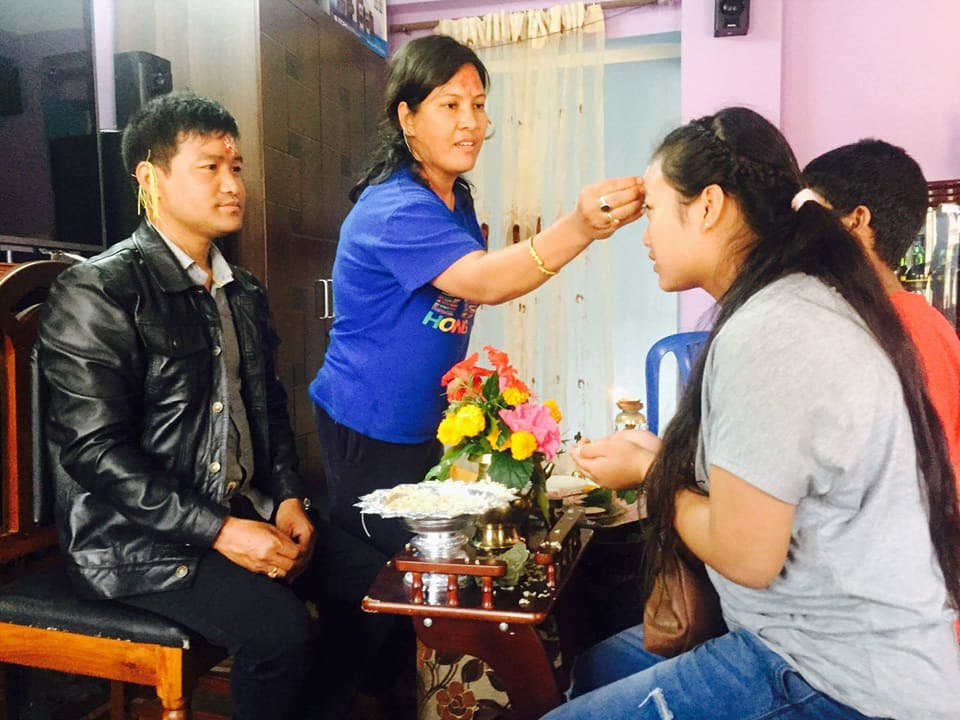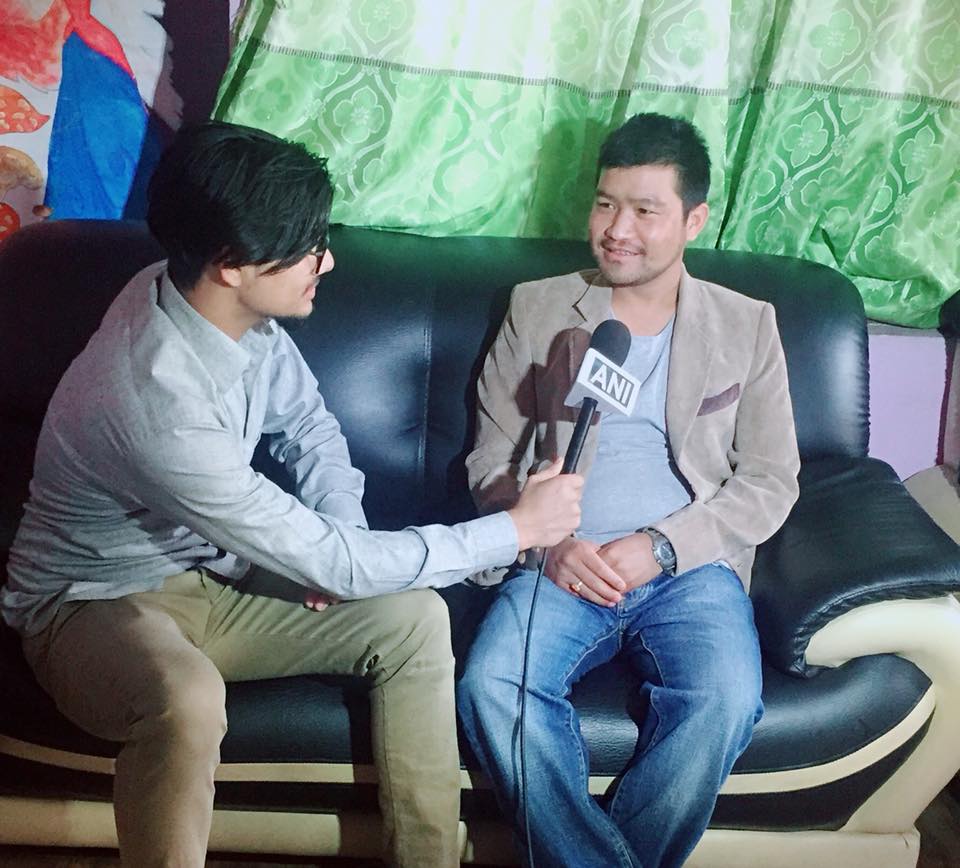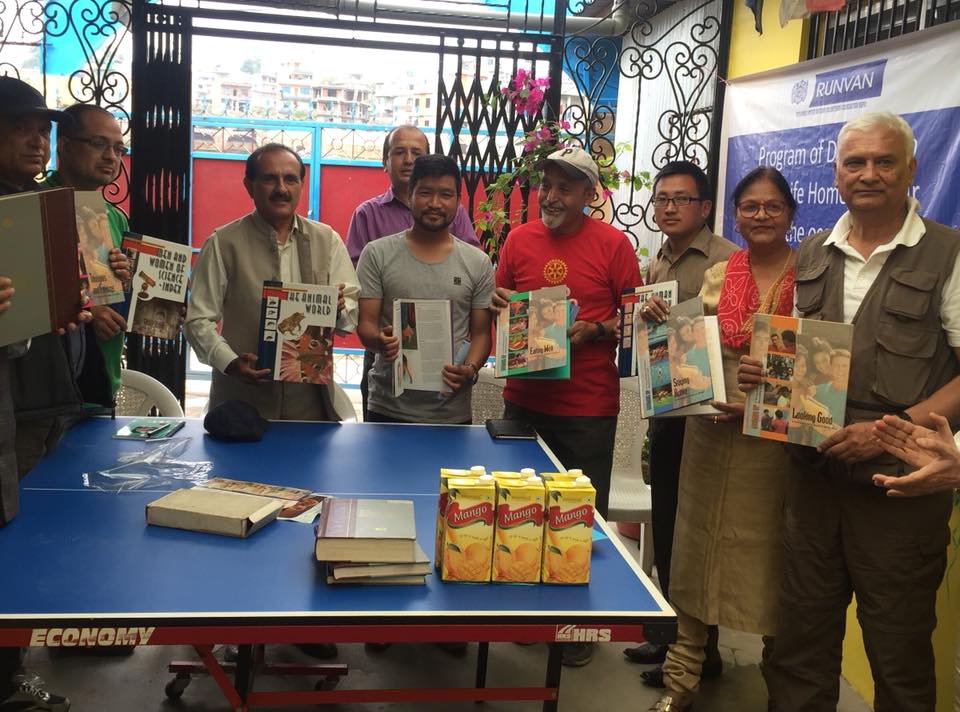HIV Infected Children Need Empathy Not Sympathy –Rajkumar Pun, SOCIAL CHANGEMAKERS BLOG ISSUE NO. 14
A news article published in a national daily changed his life forever. He was a teacher then, but left everything and became a father of HIV infected children. He along with his friend Uma Gurung established Baby Life Home, an organization providing a living space to 23 students for last 8 years. That was not enough. When they found problems to educate these HIV infected students, they also started a school named Safalta HIV Shikshya Sadan which is the first Nepali School for HIV Infected Students. This week, The Catalyst sat with Rajkumar Pun, founder of both organizations to talk about his journey.
How did you enter the field of social work?
I had no intention to do this kind of social work. I used to provide small donations sometimes, but that used to be just for my happiness. I was working as a teacher at Laboratory School, Kirtipur. Life was running normally. Once I saw a news article published in Kantipur daily. It must have been around 2008/9. The news was about how some children from Dang were thrown out of school, because they were HIV infected. They were facing hatred from family and school. Their own relatives were refusing to accept them. After reading that news my friend Uma Gurung and I decided to go there to help them.
We made a small group and collected some helpful materials to help them. Most of these things were of short-term use like glucose, copy, pencils and some clothes. We reached Dang by bus and contacted the journalist who wrote the news article. His name is Durgalal KC. He told that the organizations who were giving shelter to them also got closed due to the shortage of donations. We met them and distributed the materials. When we were distributing the clothes, I overheard a woman talking about a small girl who was HIV infected. She was the sister of her father who along with his wife passed away because of HIV Aids. She said she feared to raise her with her children because of the fear that her HIV would spread to them. She expected us to take her to Kathmandu. That statement touched my heart. The girl was her own relative, but still she was treating her like an outsider. At that very moment, I felt that I must do something for them but I didn’t know we would end up where we are now.
How did the process move ahead? Did you take her with you? When did the organization got started?
That incident got a new twist in our mind. We discussed in group and made a conclusion that at least each one of us should take one child with us as individuals so that these 8 children could find shelter. However, that was not possible by law. To take a child, one has to show one has sufficient income and adopt the child. It was a lengthy process with a lot of documents required. So, we returned back to prepare the documents. We did whatever we had to do to bring these children from that vessel of discrimination. We had to show the income of an organization and prove we can take care of these children. They needed a strong foundation and we gave it to them. We named it Baby Life Home. I submitted my salary sheet along with my home ownership papers. Uma Gurung also showed the income of her cosmetics wholesale shop for the organization. Then we went to Dang and returned back taking 4 children out from there.
Many people are helping other people in small ways either in the form of donations or materials. Few expand and develop as an organization. What were the challenges while shifting to this level?
It was hard in fact, but we could not deviate from the path we had turned into. If people are not touched, it never happens. But when they get touched by a real problem, they have to move and search for long-term solutions. First, we too wanted to help the children in the short run, like donating some material things. But after reaching to them we realized that such temporary help would just not be helpful for them because their struggle lies somewhere else. If they need help, that
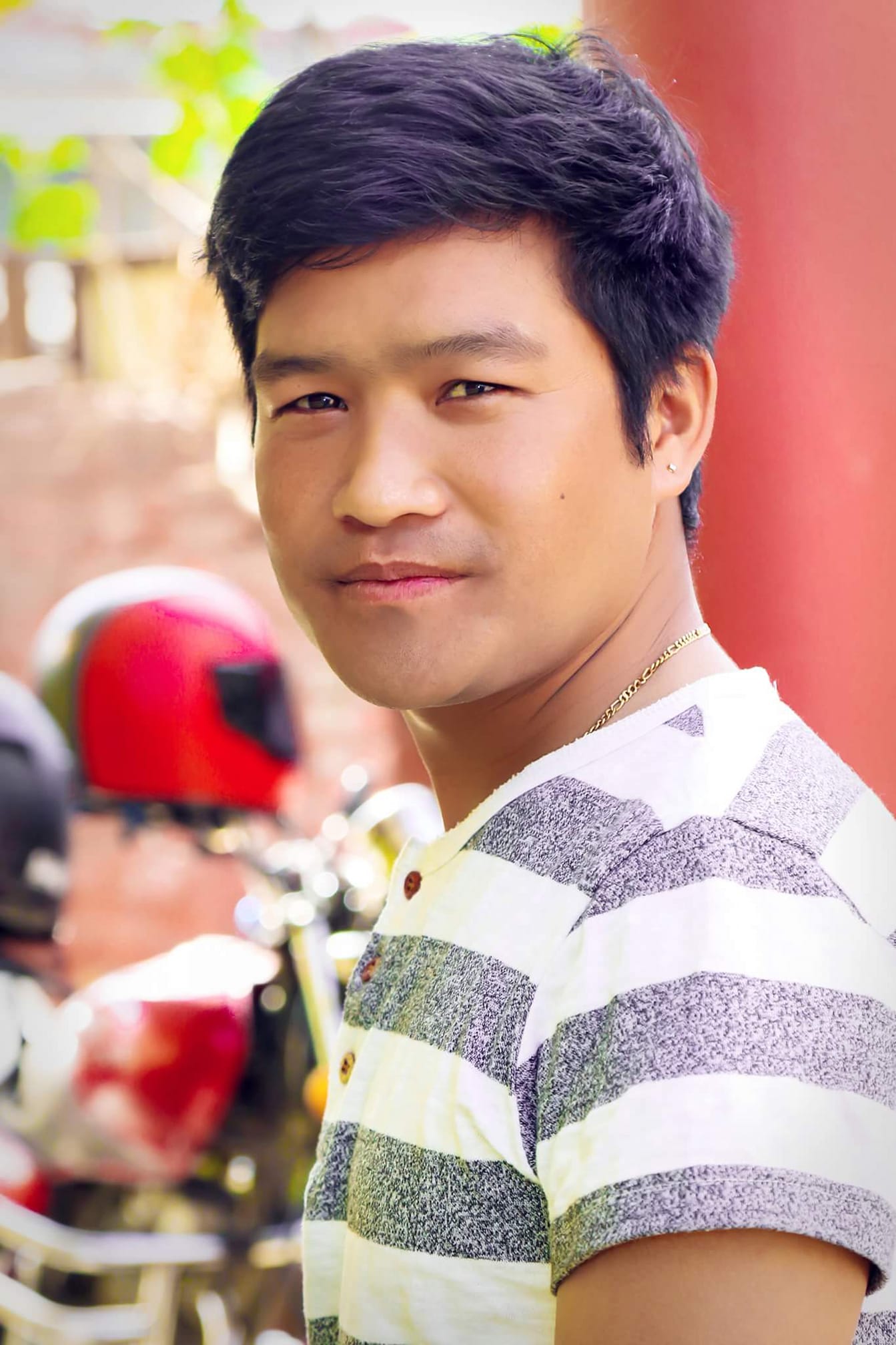
is in their education and care. When we took 4 children and started to search for a room to rent, but it was hard to get. Nobody was ready to give a room to HIV infected students. Uma jee took them to her home at Basundhara for some days, but that too was not the long-term solution. My parents were living with me in my school quarters so my home was empty. Then I took them to my own home. We made all the adjustments and necessary arrangements for them without declaring their identity. Otherwise, it would be difficult for us to live in our society. After the organizations and the local government of Dang had seen us care for them in a good way, they requested us to take 6 more children with us. We couldn’t refuse.
What were some of your early struggles?
After settling the accommodation issue, we encountered a new problem which was education of the children. We approached several schools in Kathmandu, but none of them was ready to admit them. They were sympathetic, but didn’t dare to cross the line. Then we decided to open a school for them. We started pre-primary school at first to provide them the beginning courses. Then we got the permission from the District Education Office, Kathmandu and started primary school. At that time opening a new school was not possible, because of the pressure and threat of some semi-underground political parties. Hence, we searched for another option and opened that school as Alternative School. Uma jee sold her cosmetics wholesale and I left my job. The budget was growing, so were the challenges. It was the first time in the history of Nepal a school opened to teach HIV infected students for free without concealing their identity.
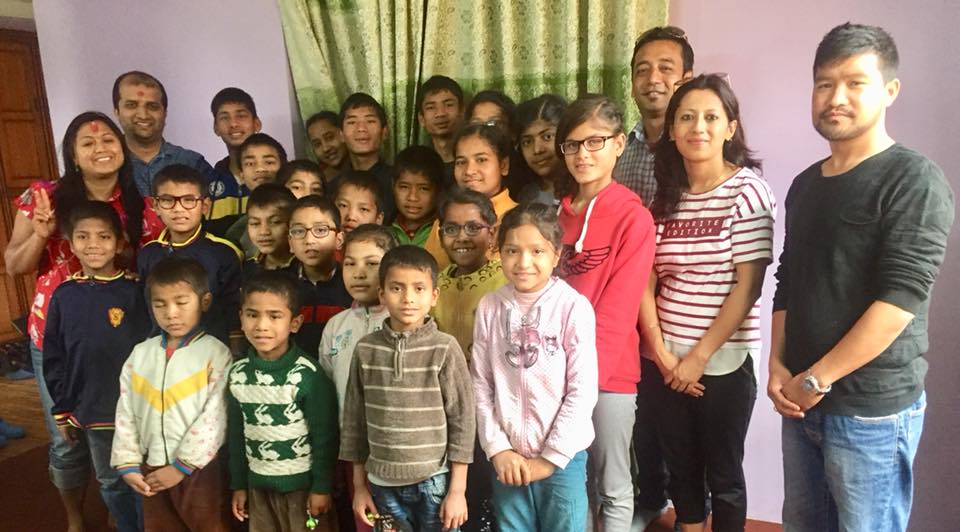
How do you take children? Are there any procedure?
We feel touched by their problem emotionally, but when we have to pick we take care of strong legal documentation so that no problem occurs. We first recognize their condition, make sure if they really need our help or not and conclude a three-way contract; between their relatives, us and the local administration. We submit the statement copy to them as well. As promised in that paper we bring them here and guarantee their better living, health, and education.
Why is a school for HIV infected children without concealing their HIV infection necessary?
It is because they were not able to read in other schools, because of their HIV infection. They became a victim of discrimination from their own family and society because of their discrimination. They were stigmatized and pushed outof school. If we encourage them to supress their identity, they will never be strong to face this society. Our main aim is to give them a respectful life even after the declaration of their HIV concealment. That’s why naming of our school is symbolic. We want to make them ‘Safal’ meaning successful, with their identity. Their medical condition should not be something to be shameful of. We should love and give them an opportunity even after their HIV concealment.
When they came here for the first they were mentally weak and tired, because of the discrimination they faced. But meeting with friends who have the same kind of story also worked as healing. We promoted dialogue between them so that they would feel free to express themselves. We give space to make them feel secure and at home so that they could concentrate on their future without fearing of their present. Our priority is to save their life through medicine and a balanced diet. We have moved towards providing them with better education with identity now.
How do you manage financially?
For our regular income, we have been doing business on our own. We have one poultry firm at Farsidol, Karyabinayak, Bhaktapur with a capacity of 1500 chickens expanded over 15 Ropani area. We three; I, Uma jee and another friend have invested in that. We also conducted potato farming nearby. Apart from that, I have released a song album including my own lyrics. When people ask me how they can help, I suggest them to buy the album. It costs only Rs. 150 but thousands have brought this CD so far. Today we have 23 children reading and sitting here. We have employed 7 teachers and one cook and one driver. Sometimes when organizations desire to help us, we ask for material help. After the Earthquake, a Gumba gifted us a van. We have to take children to the hospital for a medical check-up every month. so that was very helpful.
We have not taken long-term donation, because we know it doesn’t sustain us. We manage everything on our own. Sometimes people come and donate whatever they can. They come to celebrate their occasions like birthday and anniversary together with us. We also won awards from Central Child Welfare twice receiving 50,000 cash money with each award. Last year, the District Education Office has also given us monetary support. But these are not regular incomes.
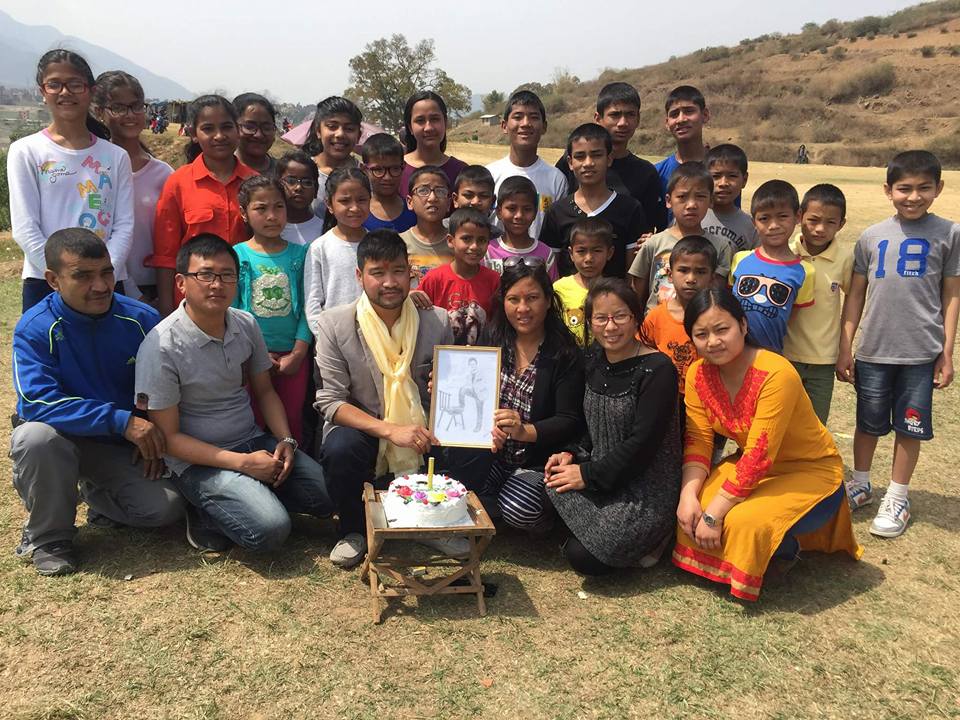
How is the environment of hospitals in Nepal for HIV infected students?
The government gives Antiretroviral therapy (ART) medicine for free, but the environment of the hospital is not so different from the society and schools. But for other diseases, hospitals deny taking the admission. Even though they know HIV-Aids won’t transfer easily, they fear to admit them. There is discrimination. I think the Nepal government and other NGOs and INGOs have invested hugely in HIV sector to aware the public. Almost everyone now knows that HIV doesn’t transfer by handshake, hugs, sharing the food and kitchen, sharing hospitals etc but still, the discrimination exists. But in practice, people hesitate to accept the fact.
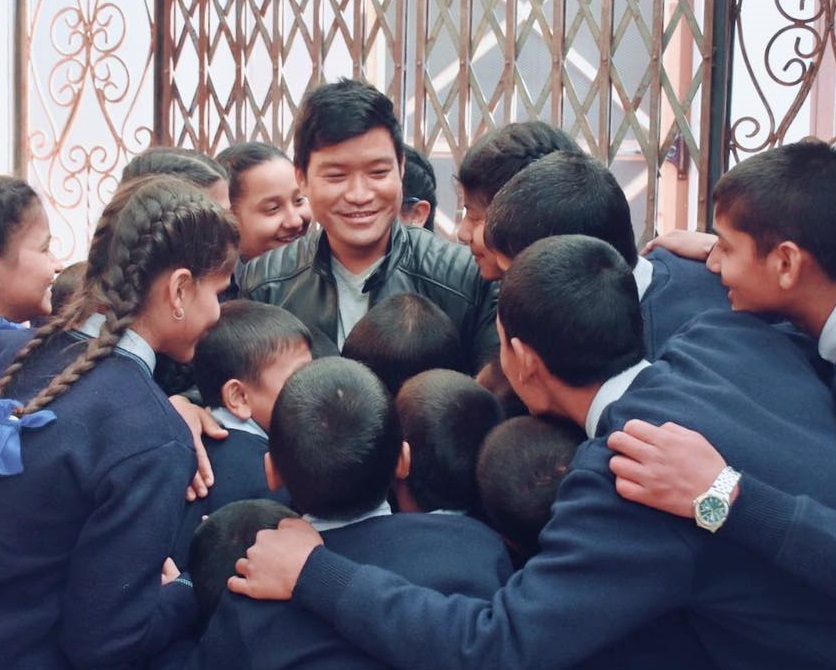
What people should understand and what they are failing to understand?
They know everything. They understand. But they are failing to convert that understanding into practical behavior. Hence, they could not welcome an HIV infected person by heart. I think this is not an issue of consciousness. We are yet to change our perception and thinking. Maybe also because we are indifferent towards such issues unless we are personally affected.
How do you think your work is changing the perception of people?
People are motivated to help them a bit but I am not sure if that is changing their perception. People come here to help but they even fear to eat together with them. This is the paradox we are facing.I think people are being sympathetic but not emphatic.A person running a school may come here to celebrate a birthday, but that doesn’t mean he will be changed to admit another HIV infected child in his school. We also struggle to find teacher in the school because even the educated people are not ready to come here and teach. People nowadays are habitual to do social things for social media only. This is just not enough in our context.
What are the things we are yet to do in this field? What do you say? How do you persuade the person who is reading this interview?
The change should come from within. It is very hard for me to answer but people should adapt themselves to humanity. They should be welcoming to everyone. Why we should not discriminate against them is also because they have no fault in carrying this virus. Even their parents have not because if they had known they had aids, they would not have given birth to them. One should think about how they would feel if this condition was happening to them.
What thing do you want to do going forward? What are the challenges do you see forthcoming?
We want to reintegrate these children to their own family and society. We want to show the community that children with HIV can live longer, can get the education and can be the better person if given education and opportunities. They should feel that they have done wrong by discriminating against them. Then only they will welcome other children with the similar condition. Speech and awareness programs can’t do much to change people’s perception. We want to expand this initiative nationwide, but not in the form we are doing now. For example, we want to make communities, schools, hospitals so that no other children in future will have to suffer from the same stigmatization. If we reduce the discrimination, in coming days, our role will be limited. I want our initiative replicated in society and family. We want these children to be a role model of our future society.
As I said earlier, we had no plan to start the organization, but circumstances made us do that. Then we moved towards establishing the school and now we are running it. Everything we did was because of the challenges we faced in our journey of survival. So, I cannot be sure what will come in our way and what fight we have to fight.
What are the things you are teaching to the children living here?
They read the courses other children are reading at other schools. Apart from that we also teach dance, art, painting, singing etc. We have employed a separate teacher for every sector. We also teach them interpersonal and communication skills so that they would feel confident when they return back to their community. We encourage them to follow their interests.
We also envision them to lead this organization themselves in our absence in the days to come. We don’t want to be here for so long. They should be able to help other children like them when they will be leading this organization. We also teach them problem-solving methods. They have made their own club here where they discuss several problems and try to solve that. We also make them the practice of the reintegration practice. We encourage them to solve their problem on their won before complaining to the teachers. They should learn to take responsibilities.
Any moments you remember which were painful or gave you happiness?
Every moments we share together with these kids is memorable. While taking them for monthly checkup I have to fight with doctors for their treatment. Once a small girl was sick. We had taken her to Teku hospital, but she urgently needed a ventilator. They referred her to Kanti Bal Hospital. We went there in their
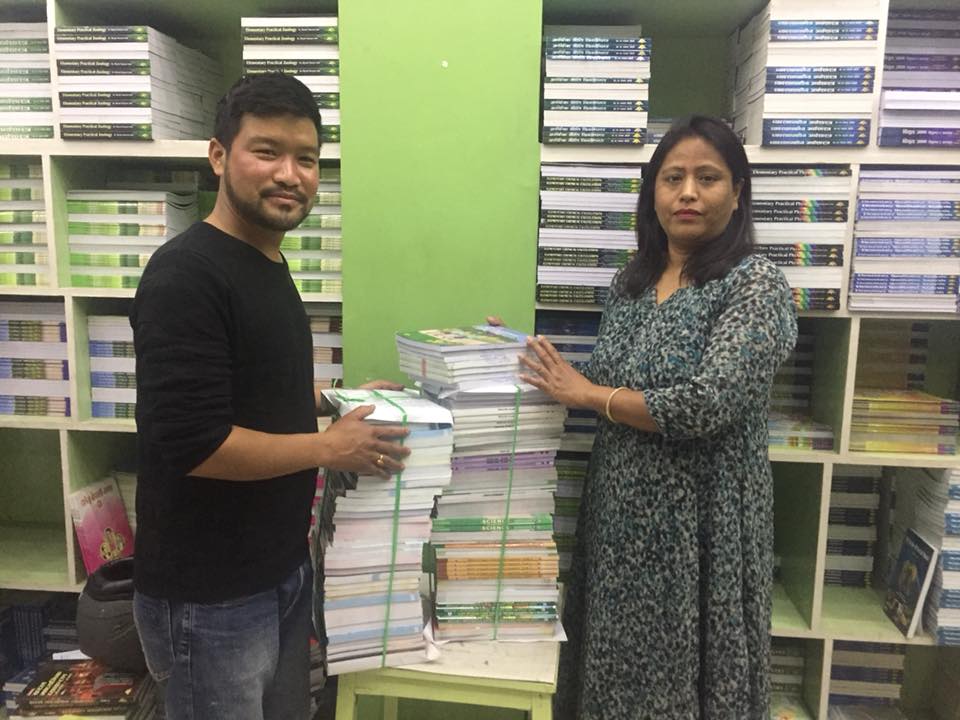
ambulance, but Kanti Bal denied to admit her saying that the ventilator is not available. We requested them, but they denied. Even they were not ready to give her oxygen. She was struggling to survive due to the delay. It was a serious moment. I quarrelled with the doctors. Called to everyone I knew. Finally, I got up to the director of the hospital through my journalist friend. And when he called the doctor in charge, we got admission. Later I found there were 4 ICU beds vacant. That moment pinched me badly. She was unsafe in the hospital. Nurses were murmuring saying that she won’t survive because she has HIV. But luckily, we were able to successfully save her life after placing her in ICU for 7 days. It was just like pulling a deer from the mouth of lion.
How do you enroll children here?
Previously we used to get children with the help of the news. But nowadays people approach us requesting to take them. But we can’t take a lot of students because of limited seats and space. If they want to take education from us, they still can send them to our school. We can afford to teach more HIV infected students, because one teacher is teaching 3 students now and he can easily teach 30 more. But we can’t keep them in the hostel. Previously we had no schools available, but we have developed an option now. We teach students for free because they should not be devoid of school just because they have the HIV virus. There could be many children reading in schools hiding their identity. We encourage them to be open and come here.
How has the community around this school changed over the period of time?
Society consists of all kind of people. Some oppose and some support when you try to do something new. This is the reality we also faced. But gradually when they saw us doing good work, their perception now has changed. Now they feel that they were wrong. We have no problem from the community now.
At last, what do you want to people who are reading this interview?
All I want to say is be encouraged to do real social work because society needs you. Do whatever you do from your heart because it connects so well and can really help and do good for another person. Then you will have no problem in dealing with any kind of problem. You will win because you see no option to go back. This is what we have learned in our journey and this is what I would like to share with people. I also request people not to treat HIV infected children as outsiders. They should be integrated and not be displaced.
Website: http://babylifehome.org/saphalta.php